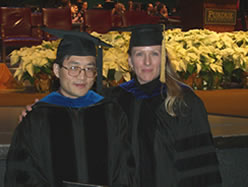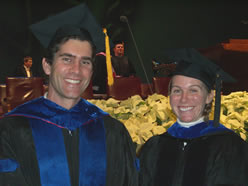Congratulations 2007-2008 Graduates

Dr. Riyan Cheng performed his Ph.D. research in the area of statisical bioinformatics under the direction of Professors Rebecca W. Doerge and Jun Xie. The title of his thesis was: "Statistical Methods for Mapping Multiple Complex Traits."
Riyan's research focuses on locating regions of the genome, or quantitative trait loci (QTL), which are associated with multiple quantitative traits that are measured on many individuals. Typically, each quantitative trait is assessed individually and single or multiple regions of the genome are statistically identified as playing a part in the phenotypic variation of the trait. Riyan extended this concept by concentrating on groups of quantitative traits that are not independent.
Riyan considered many different multiple-trait QTL mapping methods, however his most novel approaches are the application of seemingly unrelated regression equations (SURE) and the multiple-trait composite multiple-interval mapping (MTCMIM) approach. While the SURE model has been widely applied in Econometrics and other fields, it has received little attention in QTL mapping applications. Riyan realized that by allowing different sets of QTL for different traits, the SURE model approach provides flexibility for the analysis of multiple traits and multiple QTL. Alternatively, the MTCMIM model handles multiple traits and multiple QTL simultaneously while carefully selected markers are used to control background genetic variation.
After graduation in December 2007, Riyan Cheng continues to seek employment opportunities in industry.

Dr. Shannon Knapp performed her Ph.D. research in the area of statistical bioinformatics under the direction of Professor Bruce A. Craig. The title of her dissertation was: "Incorporating Uncertainty into Non-Invasive DNA-Based Mark-Recapture Population Estimates."
Determining the number of individuals in a population is an important component of wildlife management. Non-invasive mark-recapture, where DNA is collected from sources such as hair or scat, is an increasingly popular method of obtaining such an estimate. Typically each collected specimen is genotyped and these genotypes are converted into a single full-information capture history. Then a chosen estimator is used to return a single estimate of the population size. Unfortunately, non-invasive sources provide small quantities of DNA that is often degraded or contaminated, so this genotyping is prone to errors, which will bias the population estimate.
Dr. Shannon Knapp developed an algorithm, called Genotyping Uncertainty Added Variance Adjustment (GUAVA), to reduce this bias and incorporate the additional uncertainty due to these errors into the variance of the population estimate. Her algorithm incorporates a probability model to describe genotyping error. This model allows her to compute the probability that a pair of collected specimens came from a common individual, given their observed genotypes, for all pairs of specimens. The algorithm uses this set of probabilities to generate a distribution of full-information capture histories, thereby producing a distribution of estimates. The mean of the distribution represents the population estimate and the variance of the distribution is incorporated into the variance of the estimate. In her thesis, Dr. Knapp demonstrates the robustness of this approach over a range of population sizes, sample sizes, marker sets, and genotyping error rates. GUAVA not only results in a less-biased population size estimate but it also has the potential to save time and money by reducing the cost per specimen, requiring fewer loci and only a single amplification per locus, in contrast to multiple amplifications currently recommended for these studies.
Dr. Knapp is currently a Visiting Assistant Professor in the Department of Statistics at Purdue University.